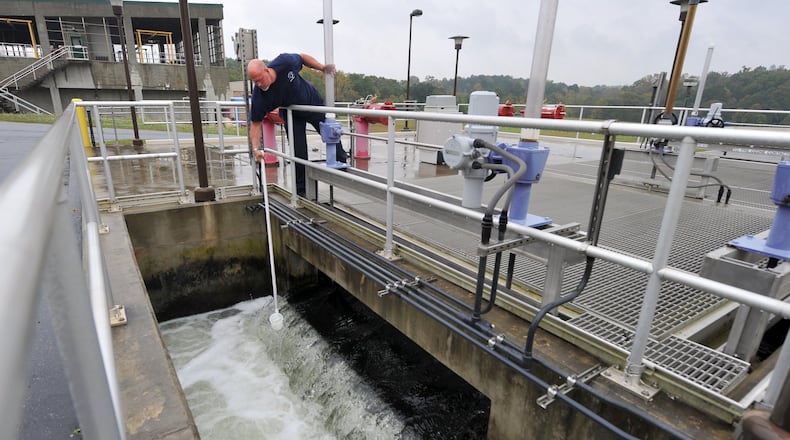Florida wants to turn back Metro Atlanta’s clock to 1992 when the population stood at 3 million, Maynard Jackson was mayor, and the Olympics were a gleam in the region’s collective eye.
In the latest salvo of the water wars, Florida Gov. Rick Scott recently asked the U.S. Supreme Court to cork Atlanta’s water usage to levels last seen two decades ago – less than half what’s likely to be needed in the future.
“Growth would come to a screeching halt,” said Bob Kerr, a Georgia negotiator in the late 1990s and early 2000s in the interstate water dispute.
If Florida prevails, Atlanta’s economic development – the 15-county region predicts a population of 7.5 million by 2035 – could take a multi-billion dollar annual hit. No new water permits, for example, means no new housing tracts, industries or skyscrapers.
But water conservation efforts currently underway could convince the Supreme Court that Atlanta is capable of managing water without onerous restrictions, water law experts say.
In August, Gov. Scott filed the court documents aimed at getting more Chattahoochee water flowing downstream from Atlanta to the Appalachicola Bay, where the oyster industry has been decimated by low water levels. The federal government had earlier declared the bay, home to 10 percent of the nation’s oyster crop, a fishery disaster.
Scott blamed Georgia’s “unmitigated and unsustainable upstream consumption of water,” and more than two decades of failed water negotiations, for the bay’s plight. Georgia Gov. Nathan Deal labeled his Florida counterpart’s broadside “a frivolous waste of time and money.”
Georgia is preparing its legal response with the goal of convincing the Supreme Court to decline to take the case. The court, though, has frequently accepted interstate battles over the “equitable apportionment” of water.
“It’s very credible – it’s about as serious as a heart attack,” said George William Sherk, a water law attorney who worked on Georgia’s case in the mid-1990s. “The court has made it explicitly clear that a state does not have the right to waste water supply.”
Last year, though, the court declined to review a decision by the 11th Circuit Court of Appeals allowing metro Atlanta to tap Lake Lanier, which is fed by the Chattahoochee and serves as the region’s major water source. Georgia was sitting pretty, convinced it had won a water-tight victory.
But Florida now wants the court to appoint a so-called special master to weigh competing claims and mandate a steady flow of water from Georgia into Florida. Alabama, the third water war combatant, has yet to take a position on the latest legal maneuver.
No signatory to Florida’s lawsuit – the governor, attorney general, director of environmental protection or outside counsel – would comment for this article. Nobody in the offices of Georgia’s governor, attorney general or environmental agency would comment either. All said the lawsuit would have to suffice with legal action pending.
One sentence in the suit jumps from the page: Florida wants to cap “Georgia’s overall depletive water uses at the level then existing on January 3, 1992.”
The phrase raised a boatload of questions for Georgia’s water warriors, chiefly, why 1992?
“I certainly find it an odd and interesting year to choose,” said Katherine Zitsch, director of the 15-county Metropolitan North Georgia Water Planning District. “It seems like a random year to pull.”
Alabama sued the U.S. Army Corps of Engineers in 1990 to keep metro Atlanta from increasing water withdrawals from the river basins that form lakes Lanier and Allatoona. Florida joined Alabama. Georgia sided with the corps.
In early 1992, the three states called a truce hoping to settle the dispute via a multi-year, multi-million dollar study to determine an equitable sharing of the Chattahoochee, Flint and Coosa rivers. Georgia, at the time, agreed to halt plans to build water-storing reservoirs.
Kerr, the state’s water war negotiator from 1996-2004, said Florida realized that there would be “a reduction in the amount of water going down stream” and that 1992 would serve as a placeholder in any future negotiations.
“Since 1992, Georgia’s municipal, industrial, recreational, and agricultural uses of (the) water have grown significantly,” the lawsuit states. But “Georgia had no entitlement to any of these inflated uses.”
Determining exactly how much water Georgia, metro Atlanta in particular, consumed in 1992 is an imprecise science. Yet a decade-old chart based on data from the state's environmental protection agency shows that metro Atlanta drew about 275 million gallons daily (mgd) from Lanier and the Chattahoochee in early 1992.
Today, the region draws about 360 mgd.
By 2040, it expects to pull 705 mgd.
Florida’s lawsuit, though, refers to “depletive” use of Georgia’s waters. Zitsch, Kerr and others assume that refers to how much water remains in the water basin after Atlanta and other municipal, industrial and agricultural users return water to the system.
Gwinnett County, for example, treats wastewater and sends it back into Lanier. Georgia Power also returns water to the Chattahoochee after cooling power generators.
In 1992, metro Atlanta put about 35 million gallons daily back into the Chattahoochee. Net consumption: 240 mgd.
A 2011 report estimated that, under a similar cap, metro Atlanta would take a $26 billion a year hit in lost business output, or 10 percent of the region’s GDP.
Sherk, the former Georgia State University water expert, said the amount available to Atlanta would be “draconian.” Katie Kirkpatrick, an executive with the Metro Atlanta Chamber, said living within those withdrawal limits “would clearly have a detrimental impact on our region, no question about it.”
Metro Atlanta’s population has risen 55 percent since 1992 to 5 million people today.
Zitsch, with the water planning district, said conservation, increased rainfall and the economic recession has reduced consumption in the region by 20 percent since 2000.
“The oystermen have troubles, and we’ve both suffered major droughts, so we understand our need to be wise stewards of the water,” said Zitsch, who also works for the Atlanta Regional Commission. “If the Supreme Court rules against us, we will work together to make sure we use our water resources wisely.”
A special master could decide if water in the river basins are equitably apportioned between Georgia, Florida and maybe Alabama. Earlier Supreme Court rulings have taken into considerable account water conservation measures.
“The court has made it explicitly clear that a state does not have the right to waste water supply,” Sherk said. “It’s probably the pre-eminent issue.”
About the Author





